21 may 2016
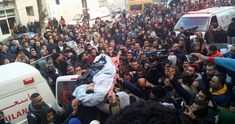
Hundreds of Palestinians marched last night in the funeral of two slain Palestinians whose bodies had been held by Israel for more than two months.
According to Quds Press, Israeli authorities handed over the bodies of Bashar Musalha, from Qalqilia, and Abd al-Rahman Radad, from Salfit, at a military checkpoint near Qalqilia where they were taken to hospital before being transferred to their hometowns.
Radad, 16, was shot and killed on March 8, 2016 for allegedly carrying out a stabbing attack in Tel Aviv, while Musalha, 22, was killed by Israeli gunfire for also an alleged stabbing attack in Yafa within the Green Line. Israel is still holding a total of 13 bodies, including 11 slain Jerusalemites and two others from al-Khalil and Bethlehem.
With the Palestinian death rate climbing as Israeli forces continue their crackdown on Palestinian protesters across the occupied West Bank and Gaza Strip's border, Israel's controversial and secretive extrajudicial killings policy is once again being questioned. Amnesty International has recently released a report titled, "No Justification for deliberate attacks on civilians, unlawful killings by Israeli forces, or collective punishment of Palestinians".
The report said that many of the Israeli killings come close to the definition of extrajudicial killings.
According to Quds Press, Israeli authorities handed over the bodies of Bashar Musalha, from Qalqilia, and Abd al-Rahman Radad, from Salfit, at a military checkpoint near Qalqilia where they were taken to hospital before being transferred to their hometowns.
Radad, 16, was shot and killed on March 8, 2016 for allegedly carrying out a stabbing attack in Tel Aviv, while Musalha, 22, was killed by Israeli gunfire for also an alleged stabbing attack in Yafa within the Green Line. Israel is still holding a total of 13 bodies, including 11 slain Jerusalemites and two others from al-Khalil and Bethlehem.
With the Palestinian death rate climbing as Israeli forces continue their crackdown on Palestinian protesters across the occupied West Bank and Gaza Strip's border, Israel's controversial and secretive extrajudicial killings policy is once again being questioned. Amnesty International has recently released a report titled, "No Justification for deliberate attacks on civilians, unlawful killings by Israeli forces, or collective punishment of Palestinians".
The report said that many of the Israeli killings come close to the definition of extrajudicial killings.
17 may 2016
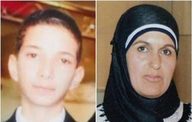
Dozens of Palestinians participated, on Tuesday at dawn, in the funeral ceremonies of a Palestinian woman, and a teenage young Palestinian, in Jabal al-Mokabber and Um Touba villages, in occupied Jerusalem, under strict Israeli restrictions and preconditions.
The two Palestinians, Fadwa Abu Teir, 50, and Mo’taz ‘Oweisat, 16, were buried in Um Touba village and in Jabal al-Mokabber, south of occupied East Jerusalem.
Abu Teir was killed by Israeli army fire on March 8, 2016, in Jerusalem’s Old City after the army alleged she “attempted to stab soldiers.” The soldiers prevented Palestinian medics from approaching the seriously injured woman, and she died of her wounds.
“The Israeli occupation army killed my mother just for suspecting that she intended to carry out an attack,” her son said, “They shot her in cold blood, then they left her to bleed to death – it seems that was not enough as they held her body for more than two months.”
He added that approximately eight persons participated in the funeral ceremony in Um Touba village mosque, and that the burial was amidst extensive Israeli military presence and tight restrictions.
The son also said that Israel placed preconditions limiting the number of funeral participants, forbidding them for taking any pictures or videos, and to pay 20.000 Israeli shekels bail.
In related news, the family of the slain child, Mo’taz Ahmad Oweisat, 16, held the funeral and burial ceremonies, also on Tuesday at dawn, in the local graveyard in Jabal al-Mokabber, south of Jerusalem.
The child was killed seven months earlier, on October 17, 2015, near the Armon Hanetziv illegal Israeli colony, built on Palestinian lands in Jabal al-Mokabber, allegedly after he “attempted to carry out a stabbing attack.”
The soldiers stopped the teen at a roadblock, and started questioning him, while examining his ID cards, and claimed that “they discovered that he carried a knife.”
The family had to wait near the graveyard for many hours, and the soldiers kept attacking locals who gathered there, before eventually allowing 45 persons to participate in the burial ceremony, under extensive military deployment and strict security measures.
Lawyer Mohammad Mahmoud of the Ad-Dameer Prisoners’ Support and Human Rights Association, said he hopes the bodies of all slain Palestinians would be transferred back to their families before the upcoming holy Muslim month of Ramadan, as recommended by the Israeli High Court.
The two Palestinians, Fadwa Abu Teir, 50, and Mo’taz ‘Oweisat, 16, were buried in Um Touba village and in Jabal al-Mokabber, south of occupied East Jerusalem.
Abu Teir was killed by Israeli army fire on March 8, 2016, in Jerusalem’s Old City after the army alleged she “attempted to stab soldiers.” The soldiers prevented Palestinian medics from approaching the seriously injured woman, and she died of her wounds.
“The Israeli occupation army killed my mother just for suspecting that she intended to carry out an attack,” her son said, “They shot her in cold blood, then they left her to bleed to death – it seems that was not enough as they held her body for more than two months.”
He added that approximately eight persons participated in the funeral ceremony in Um Touba village mosque, and that the burial was amidst extensive Israeli military presence and tight restrictions.
The son also said that Israel placed preconditions limiting the number of funeral participants, forbidding them for taking any pictures or videos, and to pay 20.000 Israeli shekels bail.
In related news, the family of the slain child, Mo’taz Ahmad Oweisat, 16, held the funeral and burial ceremonies, also on Tuesday at dawn, in the local graveyard in Jabal al-Mokabber, south of Jerusalem.
The child was killed seven months earlier, on October 17, 2015, near the Armon Hanetziv illegal Israeli colony, built on Palestinian lands in Jabal al-Mokabber, allegedly after he “attempted to carry out a stabbing attack.”
The soldiers stopped the teen at a roadblock, and started questioning him, while examining his ID cards, and claimed that “they discovered that he carried a knife.”
The family had to wait near the graveyard for many hours, and the soldiers kept attacking locals who gathered there, before eventually allowing 45 persons to participate in the burial ceremony, under extensive military deployment and strict security measures.
Lawyer Mohammad Mahmoud of the Ad-Dameer Prisoners’ Support and Human Rights Association, said he hopes the bodies of all slain Palestinians would be transferred back to their families before the upcoming holy Muslim month of Ramadan, as recommended by the Israeli High Court.
14 may 2016
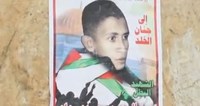
The Israeli security authorities on Friday postponed the handover of martyr Abdul-Rahman Raddad, who was killed by an Israeli soldier last March, to his family.
The uncle of the martyr, Mohamed Raddad, said that the Palestinian liaison office told the family that the Israeli side decided to postpone the delivery of its son's body until Sunday or Monday, without providing reasons.
Earlier, the Israeli security authorities had informed the Palestinian side of their intention to hand over the body of Abdul-Rahman at a checkpoint in Qalqiliya city on Friday evening.
Raddad was killed after he carried out a stabbing attack in Petah Tikva settlement in Tel Aviv on March 8. For its part, the family of martyr Abdul-Fattah al-Sharif, from al-Khalil city, rejected the Israeli preconditions for the release of his body.
The Israeli security authorities demanded the family of Abdul-Fattah to bury his body at night in the presence of 30 people from his family at most and not to use cellphones or any other means to capture video pictures of the funeral.
The uncle of the martyr, Mohamed Raddad, said that the Palestinian liaison office told the family that the Israeli side decided to postpone the delivery of its son's body until Sunday or Monday, without providing reasons.
Earlier, the Israeli security authorities had informed the Palestinian side of their intention to hand over the body of Abdul-Rahman at a checkpoint in Qalqiliya city on Friday evening.
Raddad was killed after he carried out a stabbing attack in Petah Tikva settlement in Tel Aviv on March 8. For its part, the family of martyr Abdul-Fattah al-Sharif, from al-Khalil city, rejected the Israeli preconditions for the release of his body.
The Israeli security authorities demanded the family of Abdul-Fattah to bury his body at night in the presence of 30 people from his family at most and not to use cellphones or any other means to capture video pictures of the funeral.
9 may 2016
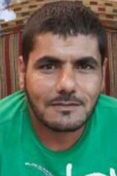
The Israel Authorities releases, on Monday at dawn, the body of a Palestinian who was shot and killed by the soldiers, on November 10 2015, and only allowed a limited number of family members to participate in the funeral ceremony and burial, in Jerusalem.
The Palestinian, Mohammad Abed Nimir, 37, from the al-‘Eesawiyya town in Jerusalem, was buried at the Mujahidin Graveyard, in Salaheddin area, in occupied Jerusalem.
Nimir was fatally shot on November 10 of last year, after the soldiers alleged he attempted to stab them, while eyewitnesses denied the claims.
After being prevented from participating in the funeral ceremony, many Palestinians and relatives gathered near Salaheddin Street, before the soldiers attacked them to force them away.
Dozens of soldiers and mounted police were deployed near Bab al-Sahera (Herod’s Gate), and sealed various streets and neighborhoods until the funeral ceremony was concluded in early morning hours.
Israel only allowed 30 persons to participate in the funeral ceremony, and prevented them from using their mobile phones, after forcing the family to pay 20.000 Shekels to guarantee the implementation of these preconditions.
Nimir’s father said Israel deliberately tortured the family by refusing to release its son’s body for burial, since he was killed in the al-Misrara Street in Jerusalem, six months ago.
“Israel imposed very tough restrictions, and preconditions, before allowing us to conduct the burial ceremony,” the father said, “But we want to burry our slain son, to let him rest in peace, and now Jerusalem’s soil is embracing him.”
Lawyer Mohammad Mahmoud of the Ad-Dameer Prisoner Support and Human Rights Association, said Israel started the process of releasing the corpses of many slain Palestinians, after the Supreme Court held a session, last Thursday, and recommended their release.
Mahmoud added that the Israeli Authorities removed Nimir’s body from the fridge 48 hours prior to releasing it, in contrary to previous incidents when the remains of slain Palestinian were released while still frozen.
The lawyer also said he believes Israel will release the corpses of the remaining eleven slain Palestinians in the coming few days, as the Israeli court ordered their release before the Muslim Month of Ramadan.
Israel is still holding the remains of 13 Jerusalemite slain Palestinians;
The Palestinian, Mohammad Abed Nimir, 37, from the al-‘Eesawiyya town in Jerusalem, was buried at the Mujahidin Graveyard, in Salaheddin area, in occupied Jerusalem.
Nimir was fatally shot on November 10 of last year, after the soldiers alleged he attempted to stab them, while eyewitnesses denied the claims.
After being prevented from participating in the funeral ceremony, many Palestinians and relatives gathered near Salaheddin Street, before the soldiers attacked them to force them away.
Dozens of soldiers and mounted police were deployed near Bab al-Sahera (Herod’s Gate), and sealed various streets and neighborhoods until the funeral ceremony was concluded in early morning hours.
Israel only allowed 30 persons to participate in the funeral ceremony, and prevented them from using their mobile phones, after forcing the family to pay 20.000 Shekels to guarantee the implementation of these preconditions.
Nimir’s father said Israel deliberately tortured the family by refusing to release its son’s body for burial, since he was killed in the al-Misrara Street in Jerusalem, six months ago.
“Israel imposed very tough restrictions, and preconditions, before allowing us to conduct the burial ceremony,” the father said, “But we want to burry our slain son, to let him rest in peace, and now Jerusalem’s soil is embracing him.”
Lawyer Mohammad Mahmoud of the Ad-Dameer Prisoner Support and Human Rights Association, said Israel started the process of releasing the corpses of many slain Palestinians, after the Supreme Court held a session, last Thursday, and recommended their release.
Mahmoud added that the Israeli Authorities removed Nimir’s body from the fridge 48 hours prior to releasing it, in contrary to previous incidents when the remains of slain Palestinian were released while still frozen.
The lawyer also said he believes Israel will release the corpses of the remaining eleven slain Palestinians in the coming few days, as the Israeli court ordered their release before the Muslim Month of Ramadan.
Israel is still holding the remains of 13 Jerusalemite slain Palestinians;
- Tha’er Abu Ghazala.
- Hasan Manasra.
- Baha Oleyyan.
- Ala Abu Jamal.
- Mo’taz Oweisat.
- Abdul-Mohsen Hassouna.
- Mohammad Abu Khalaf.
- Fuad Kassab Abu Rajab.
- Bashar Mohammad Masalha.
- Abdul-Rahman Mahmoud Raddad.
- Abdul-Malek Saleh Abu Kharroub.
- Mahmoud Jamal al-Kalouti.
- Fadwa Abu Teir.
5 may 2016
|
|
The Israeli higher court on Thursday morning issued a verdict ordering the Israeli security authorities to hand over the detained bodies of Palestinians to their families.
According to the court verdict, the handover of those bodies must take place as of next week and gradually before the coming holy month of Ramadan. The Israeli security authorities are still holding bodies of 18 Palestinians killed in Jerusalem and the West Bank. 14 of those Palestinians are from Jerusalem and its suburbs. |
24 apr 2016
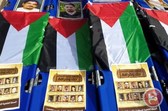
Israel’s High Court on Sunday ruled to hold a hearing next month in order to reach a decision on Israel’s return of the bodies of 15 Palestinians who were killed while allegedly carrying out attacks on Israeli forces.
A lawyer who filed appeals on behalf of the slain Palestinians’ families, Muhammad Mahmoud, told Ma’an the court will convene on May 5 to set a date and terms for the handover of the bodies by the Israeli authorities.
Sunday’s hearing came after initially being postponed by the court due to recent Jewish holidays, said Mahmoud, working on behalf of prisoners’ rights group Addameer.
Addameer reported following an April 18 hearing that the return of the 15 bodies would likely be “subject to extreme security measures” by the Israeli authorities.
The Israeli leadership in October approved a policy to withhold the bodies of Palestinians who were shot dead while allegedly attempting or carrying out attacks on Israelis.
Over 200 Palestinians have been killed during the recent unrest -- the majority during alleged attacks -- and Israel held the bodies of least 80 Palestinians for various periods of time before slowly reversing the policy in December, according to UN figures.
The policy had not been carried out with such frequency since the Second Intifada and sparked major backlash among Palestinian communities.
According to Addameer, Israel continues to withhold 15 bodies of those killed during recent unrest, despite the fact that some of the families “agreed to the extremely harsh and arbitrary conditions” demanded by the authorities for their release.
Addameer earlier this month called Israel’s decision keep the bodies “an extremely humiliating practice and one degrading to the human dignity of the deceased, family members, and to the cultural and religious norms of Palestinian society.”
Last month, senior PLO official Saeb Erekat for his part urged the international community to pressure Israel to release the bodies, saying: "Israel's collective punishments are now being carried out against the living and the dead."
A lawyer who filed appeals on behalf of the slain Palestinians’ families, Muhammad Mahmoud, told Ma’an the court will convene on May 5 to set a date and terms for the handover of the bodies by the Israeli authorities.
Sunday’s hearing came after initially being postponed by the court due to recent Jewish holidays, said Mahmoud, working on behalf of prisoners’ rights group Addameer.
Addameer reported following an April 18 hearing that the return of the 15 bodies would likely be “subject to extreme security measures” by the Israeli authorities.
The Israeli leadership in October approved a policy to withhold the bodies of Palestinians who were shot dead while allegedly attempting or carrying out attacks on Israelis.
Over 200 Palestinians have been killed during the recent unrest -- the majority during alleged attacks -- and Israel held the bodies of least 80 Palestinians for various periods of time before slowly reversing the policy in December, according to UN figures.
The policy had not been carried out with such frequency since the Second Intifada and sparked major backlash among Palestinian communities.
According to Addameer, Israel continues to withhold 15 bodies of those killed during recent unrest, despite the fact that some of the families “agreed to the extremely harsh and arbitrary conditions” demanded by the authorities for their release.
Addameer earlier this month called Israel’s decision keep the bodies “an extremely humiliating practice and one degrading to the human dignity of the deceased, family members, and to the cultural and religious norms of Palestinian society.”
Last month, senior PLO official Saeb Erekat for his part urged the international community to pressure Israel to release the bodies, saying: "Israel's collective punishments are now being carried out against the living and the dead."
17 apr 2016
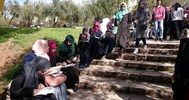
The longest chain of readers in the was organized on Saturday in 13 Arab and European countries in memory of the Jerusalemite martyr Baha Elaiyan.
The event included participants from Palestine, Jordan, Lebanon, Algeria, Morocco, Tunisia, UAE, France, Germany, Canada, Belgium, America and Italy.
Shadi Elaiyan, one of the chain organizers, told Quds Press that the idea was a continuation of the reader chain organized previously by martyr Elaiyan and his friends on March 16, 2014 around the historical wall of Occupied Jerusalem with the participation of thousands of Palestinians including poets, writers, students, and children.
The participants will gather to read books and form a chain of readers on the street before collecting their books for donation in order to open bookstores in the villages and towns which are exposed to Israeli attacks by both soldiers and settlers.
Activist Elaiyan revealed that the organizers aim at marking the memory of martyr Baha Elaiyan and continuing his reading journey for acquainting people with the importance of reading and education as well as for shedding light on the Israeli crime of detaining the bodies of 15 martyrs who were killed by Israeli forces during Jerusalem Intifada including the body of Baha Elaiyan.
The event included participants from Palestine, Jordan, Lebanon, Algeria, Morocco, Tunisia, UAE, France, Germany, Canada, Belgium, America and Italy.
Shadi Elaiyan, one of the chain organizers, told Quds Press that the idea was a continuation of the reader chain organized previously by martyr Elaiyan and his friends on March 16, 2014 around the historical wall of Occupied Jerusalem with the participation of thousands of Palestinians including poets, writers, students, and children.
The participants will gather to read books and form a chain of readers on the street before collecting their books for donation in order to open bookstores in the villages and towns which are exposed to Israeli attacks by both soldiers and settlers.
Activist Elaiyan revealed that the organizers aim at marking the memory of martyr Baha Elaiyan and continuing his reading journey for acquainting people with the importance of reading and education as well as for shedding light on the Israeli crime of detaining the bodies of 15 martyrs who were killed by Israeli forces during Jerusalem Intifada including the body of Baha Elaiyan.
16 apr 2016
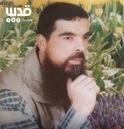
The Israeli army Friday evening mistakenly returned the body of a Palestinian who was shot and killed by Israeli forces the previous day in the southern occupied West Bank district of Hebron, an Israeli army spokesperson said.
The transfer of the body of Ibrahim Baradiya, 54, was reportedly made without government approval. The spokesperson added the mistake occurred due to a political “misunderstanding” and that the army was investigating the matter.
Palestinian military liaisons received the body on Friday, and it was taken to al-Ahli hospital in Hebron. Baradiya’s family reportedly said he will be buried after noon prayers on Saturday.
Baradiya was shot and killed by Israeli forces Thursday at the entrance of al-Arroub refugee camp in Hebron after allegedly attempting to attack an Israeli soldier with an ax.
At least two Palestinians have been injured since and at least one detained by Israeli forces during clashes near the camp.
According to the UN, prior to Baradiya's killing there had been no Palestinian or Israeli fatalities recorded in the context of attacks or clashes for two consecutive weeks -- the longest period without deaths since a wave of unrest spread across the occupied Palestinian territory in October that has left more than 200 Palestinians killed by Israeli forces and settlers.
The unrest has been marked by a surge of small-scale attacks carried out by Palestinian individuals -- predominantly on Israeli military targets -- which have left nearly 30 Israelis dead, with the majority of suspected Palestinian attackers shot dead on site.
The return of the bodies of slain Palestinians to their families became a contentious issue since the escalation of violence began after the Israeli authorities launched a policy of withholding the bodies of alleged attackers, in what rights groups decried as collective punishment of their families.
The policy was largely reversed in December, following concerns from Israel's security establishment that it was only further stoking tensions, although a number of bodies continue to be held.
However, a decision by Israeli Prime Minister Benjamin Netanyahu and Defense Minister Moshe Yaalon three weeks ago stopped the transfer of Palestinian bodies held by the Israel to the Palestinian Authority, according to Haaretz.
Last month, senior PLO official Saeb Erekat urged the international community to pressure Israel to release the bodies, saying: "Israel's collective punishments are now being carried out against the living and the dead."
A joint statement released earlier this month by Addameer and Israeli minority rights group Adalah condemned Israel’s practice of withholding bodies as "a severe violation of international humanitarian law as well as international human rights law, including violations of the right to dignity, freedom of religion, and the right to practice culture."
The transfer of the body of Ibrahim Baradiya, 54, was reportedly made without government approval. The spokesperson added the mistake occurred due to a political “misunderstanding” and that the army was investigating the matter.
Palestinian military liaisons received the body on Friday, and it was taken to al-Ahli hospital in Hebron. Baradiya’s family reportedly said he will be buried after noon prayers on Saturday.
Baradiya was shot and killed by Israeli forces Thursday at the entrance of al-Arroub refugee camp in Hebron after allegedly attempting to attack an Israeli soldier with an ax.
At least two Palestinians have been injured since and at least one detained by Israeli forces during clashes near the camp.
According to the UN, prior to Baradiya's killing there had been no Palestinian or Israeli fatalities recorded in the context of attacks or clashes for two consecutive weeks -- the longest period without deaths since a wave of unrest spread across the occupied Palestinian territory in October that has left more than 200 Palestinians killed by Israeli forces and settlers.
The unrest has been marked by a surge of small-scale attacks carried out by Palestinian individuals -- predominantly on Israeli military targets -- which have left nearly 30 Israelis dead, with the majority of suspected Palestinian attackers shot dead on site.
The return of the bodies of slain Palestinians to their families became a contentious issue since the escalation of violence began after the Israeli authorities launched a policy of withholding the bodies of alleged attackers, in what rights groups decried as collective punishment of their families.
The policy was largely reversed in December, following concerns from Israel's security establishment that it was only further stoking tensions, although a number of bodies continue to be held.
However, a decision by Israeli Prime Minister Benjamin Netanyahu and Defense Minister Moshe Yaalon three weeks ago stopped the transfer of Palestinian bodies held by the Israel to the Palestinian Authority, according to Haaretz.
Last month, senior PLO official Saeb Erekat urged the international community to pressure Israel to release the bodies, saying: "Israel's collective punishments are now being carried out against the living and the dead."
A joint statement released earlier this month by Addameer and Israeli minority rights group Adalah condemned Israel’s practice of withholding bodies as "a severe violation of international humanitarian law as well as international human rights law, including violations of the right to dignity, freedom of religion, and the right to practice culture."
